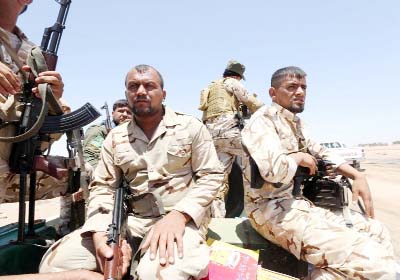
AP, Kessarrat :
Ali Ahsan paced back and forth carrying a rifle more than half his height in the searing heat as his militia convoy made a pit stop in the Anbar desert to rest and pray.
Unlike the rugged men in fatigues around him, his prepubescent face has barely sprung a whisker. Now that school is out, the petite 14-year-old is spending his summer break fighting the Islamic State group with his father and other members of Iraq’s Popular Mobilization Forces, which includes the Shiite militias.
“I’m here because it’s my duty,” the stone-faced boy in blue jeans said, referring to an edict from Iraq’s highest Shiite religious authority last year. “The Popular Mobilization Forces are not sectarian forces. They represent all of Iraq, and I want to help them liberate Iraq.”
Despite concerns over heightened sectarian strife, Shiite militiamen continue to pour into Iraq’s Sunni heartland of Anbar province with the initial hope of recapturing Fallujah, the first major Iraqi city to fall to the Islamic State group last year.
As the U.S. prepares to send an additional 450 personnel to Iraq, the Iranian-backed militias say that coalition assistance only hurts their efforts, contradicting statements by the Iraqi government that more international support is needed.
IS fighters captured Anbar’s provincial capital of Ramadi last month, prompting Defense Secretary Ash Carter to lament that the U.S.-trained Iraqi troops lacked “the will to fight.” The Popular Mobilization Forces were called to battle in Anbar after the fall of Ramadi, despite concerns that their involvement in the province would antagonize the Sunni population, and they are now setting their sights on Fallujah.
“We think the liberation of Fallujah will allow us to enter Ramadi without any fighting, so the battle that we are preparing is the battle of Fallujah,” Hadi al-Amiri, the head of the Popular Mobilization Forces, told journalists Friday at an outpost on the Salahuddin-Anbar border. “God willing, it will be imminent.”
President Barack Obama’s decision to expand the U.S. force of more than 3,000 soldiers already in Iraq followed his acknowledgement earlier this week that Washington still lacks a “complete strategy” for training Iraqi forces to fight the Islamic State. A U.S.-led coalition has launched more than 1,900 airstrikes in Iraq since August 2014 to mixed results.
Ali Ahsan paced back and forth carrying a rifle more than half his height in the searing heat as his militia convoy made a pit stop in the Anbar desert to rest and pray.
Unlike the rugged men in fatigues around him, his prepubescent face has barely sprung a whisker. Now that school is out, the petite 14-year-old is spending his summer break fighting the Islamic State group with his father and other members of Iraq’s Popular Mobilization Forces, which includes the Shiite militias.
“I’m here because it’s my duty,” the stone-faced boy in blue jeans said, referring to an edict from Iraq’s highest Shiite religious authority last year. “The Popular Mobilization Forces are not sectarian forces. They represent all of Iraq, and I want to help them liberate Iraq.”
Despite concerns over heightened sectarian strife, Shiite militiamen continue to pour into Iraq’s Sunni heartland of Anbar province with the initial hope of recapturing Fallujah, the first major Iraqi city to fall to the Islamic State group last year.
As the U.S. prepares to send an additional 450 personnel to Iraq, the Iranian-backed militias say that coalition assistance only hurts their efforts, contradicting statements by the Iraqi government that more international support is needed.
IS fighters captured Anbar’s provincial capital of Ramadi last month, prompting Defense Secretary Ash Carter to lament that the U.S.-trained Iraqi troops lacked “the will to fight.” The Popular Mobilization Forces were called to battle in Anbar after the fall of Ramadi, despite concerns that their involvement in the province would antagonize the Sunni population, and they are now setting their sights on Fallujah.
“We think the liberation of Fallujah will allow us to enter Ramadi without any fighting, so the battle that we are preparing is the battle of Fallujah,” Hadi al-Amiri, the head of the Popular Mobilization Forces, told journalists Friday at an outpost on the Salahuddin-Anbar border. “God willing, it will be imminent.”
President Barack Obama’s decision to expand the U.S. force of more than 3,000 soldiers already in Iraq followed his acknowledgement earlier this week that Washington still lacks a “complete strategy” for training Iraqi forces to fight the Islamic State. A U.S.-led coalition has launched more than 1,900 airstrikes in Iraq since August 2014 to mixed results.

